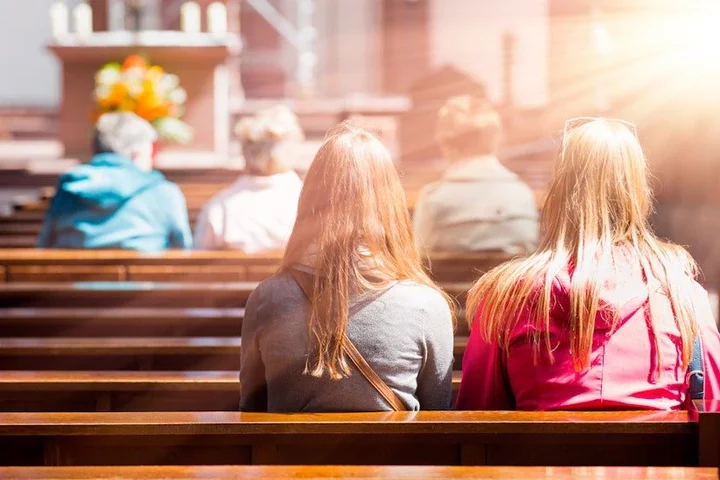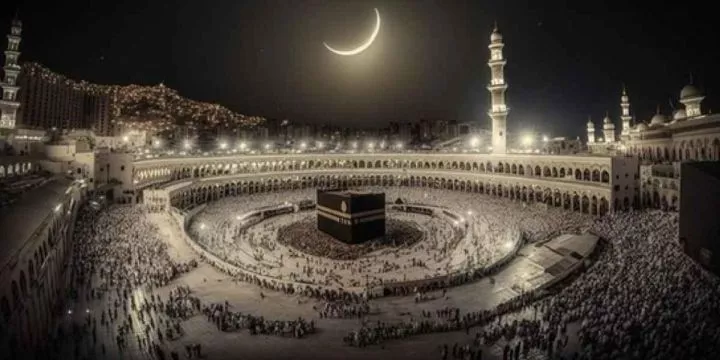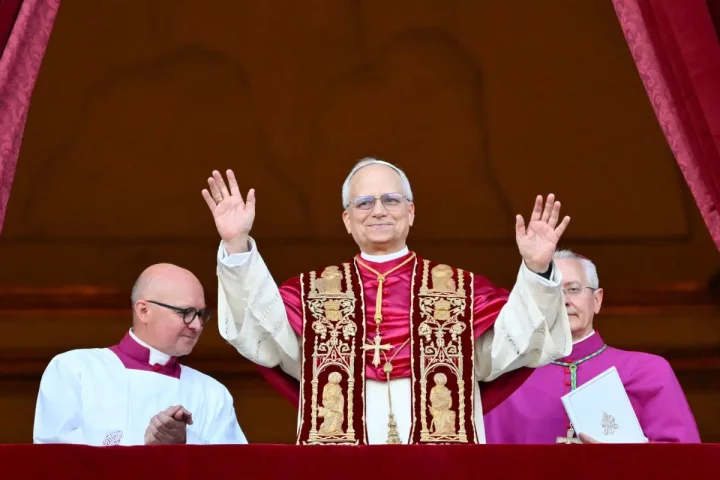In this article, we will look at the 30 most religious cities in the world. You can skip our detailed discussion of the global trends in religious affinity and see 5 Most Religious Cities in the World.
Global Trends in Religious Affinity
Religious affinity is not a concept built in black and white; it depends on several factors, with culture, traditions, and geographical location being some of them. The global religious profile is changing rapidly, with differences in youth population sizes among the prominent religions in the world and changing fertility rates being the prime drivers of this change. Data from the Pew Research Center predicts Christians to be the largest religious group across the globe in the next four decades.
However, data suggests Islam is the fastest-growing religion, with the possibility of Muslims becoming almost equal in number to Christians by 2050 if current religious trends persist. They are anticipated to make up around 10% of the total European population and increase in number in India as well. While India is expected to retain its Hindu majority, it might also become home to the largest Muslim population in the world, surpassing Indonesia.
Religious trends in the United States predict a declining Christian population, going from three-quarters of the total population in 2010 to two-thirds by 2050. Islam is also expected to surpass Judaism as the largest non-Christian religion in the country. Agnostics, atheists, and other religiously unaffiliated individuals are expected to decline in number over the next decades but may increase in certain countries, including France and the United States. In addition, Hindu and Jewish populations are also expected to increase. The global Buddhist population, in contrast, might remain stagnant, standing at the same size as in 2010.
All the major religions in the world are expected to undergo at least some growth in the coming decades, with the exception of Buddhism. The global Buddhist population is expected to remain stable, primarily because of the aging population in countries such as Japan, Thailand, and China and low fertility rates.
Why Are Religious Affiliations Growing and Declining?
One of the primary factors behind the potential growth of religions is the geographical region of their concentration. Religions concentrated in developing countries with decreasing infant mortality rates and high birth rates are highly likely to grow rapidly. For reference, a major chunk of the global growth of Islam and Christianity is anticipated to occur in sub-Saharan Africa. That is one of the significant determinants behind a decline in religiously unaffiliated individuals across the globe: they are heavily concentrated in aging populations and regions with low fertility rates. These include North America, Europe, China, and Japan.
Regional Religious Affiliation Projections
Sub-Saharan Africa is expected to undergo the fastest overall growth in population due to its high fertility rates, going from 12% of the global population in 2010 to around 20% in 20250. Population growth in this region is highly likely to cause a boost in its Muslim population. In addition, the region's Christian population is also expected to double, increasing from 517 million to 1.1 billion between 2010 and 2050. This rise would increase the percentage of Christians living in sub-Saharan Africa from 24% to 38% in the same period.
Niger, Djibouti, and Nigeria rank among the most religious countries in the African continent and across the globe, with Nigeria taking the lead. Nigeria is a Muslim-majority country located in the Gulf of Guinea, and is a middle-income, mixed economy. Its expanding financial, manufacturing, communications, service, and technology markets make it an emerging market on a global scale. According to data from the World Bank, Nigeria's economy underwent sustainable and broad-based growth of 7% per annum on average between 2000 and 2014, driven by favorable macroeconomic reforms and global conditions. However, growth rates and GDP per capita declined between 2015 and 2022. This occurred for several reasons, including an expensive fuel subsidy program, exchange rate policy distortions, elevated trade protectionism, external factors such as the COVID-19 pandemic, and rising fiscal deficits due to reduced oil production. Nigeria's inflation levels reached a 24-year high in February 2024, standing at 31.7% due to weakening economic fundamentals and sluggish growth. This pushed millions of residents of the country into poverty.
However, a change in administration in May 2023 resulted in a re-establishment of macroeconomic conditions in the country, boosting growth and stability. The oil sector provides for around 95% of the country's foreign exchange earnings, and makes up for 80% of its budgetary revenues. Apart from the state-owned Nigeria National Petroleum and Nigeria Liquefied Natural Gas companies, MTN Nigeria (JSE:MTN) is one of the biggest companies in the country. Founded in 2000, the company is a subsidiary of the parent company MTN International (Mauritius) Limited, and is a major player in the Nigerian telecommunications industry.
MTN Group (JSE:MTN) is the largest mobile network operator in Africa, and is used by around 288 million customers in 18 African markets. On August 7, the company announced agreement plans with IHS in Nigeria, which is a subsidiary of IHS Holding Limited (NYSE:IHS), to extend and renew all Nigeria tower Master Lease Agreements until December 2032. This covers around 13,5000 tenancy contracts, and demonstrates infrastructure improvement plans by the two companies to broaden mobile connectivity in the country while navigating emerging global and local macro conditions.
Now that we have taken an overview of the trends in religious affiliations across the globe, let's look at the 30 most religious cities in the world.

Our Methodology
To compile a list of the 30 most religious cities in the world, we first came up with a list of the 30 most religious countries in the world. We used data from a 2018 report by the PEW Research Center that surveyed respondents in over 100 countries on four metrics - their affiliation with a religion, whether they attended a weekly religious service, if they prayed daily, and if they considered religion 'very important' or not. We took the average of all four metrics to come up with the Insider Monkey Score and ranked our list according to it. We then used these countries as proxies for their largest cities to compile our list of the most religious cities in the world. The 30 most religious cities in the world are arranged in ascending order of their Insider Monkey Scores.
At Insider Monkey we are obsessed with the stocks that hedge funds pile into. The reason is simple: our research has shown that we can outperform the market by imitating the top stock picks of the best hedge funds. Our quarterly newsletter's strategy selects 14 small-cap and large-cap stocks every quarter and has returned 275% since May 2014, beating its benchmark by 150 percentage points (see more details here).
30 Most Religious Cities in the World
30. Tunis, Tunisia
Affiliation with religion: 100%
Weekly worship attendance: 47%
Percentage of people who pray daily: 67%
Perception of religion as very important: 78%
Insider Monkey Score: 73
Tunis, the capital of Tunisia, ranks 30th on our list of the 30 most religious cities in the world. The city has an Insider Monkey Score of 73 and a weekly worship attendance rate of 47%.
29. Cairo, Egypt
Affiliation with religion: 100%
Weekly worship attendance: 62%
Percentage of people who pray daily: 72%
Perception of religion as very important: 72%
Insider Monkey Score: 76.5
The famous city of Cairo ranks 29th on our list with an Insider Monkey Score of 76.5. The city has a 100% affiliation with religion, with 90% of the population Muslim and 10% Christian.
28. San Salvador, El Salvador
Affiliation with religion: 88%
Weekly worship attendance: 61%
Percentage of people who pray daily: 77%
Perception of religion as very important: 85%
Insider Monkey Score: 77.75
The capital of El Salvador, San Salvador, has a weekly worship attendance of 61%, and an 88% affiliation with religion. It ranks 28th on our list of the most religious cities in the world.
27. Managua, Nicaragua
Affiliation with religion: 93%
Weekly worship attendance: 55%
Percentage of people who pray daily: 75%
Perception of religion as very important: 88%
Insider Monkey Score: 77.75
With an Insider Monkey Score of 77.75, Managua takes the 27th spot on our list. It is the capital of Nicaragua, and 75% of its residents pray daily.
26. Gaza City, Palestine
Affiliation with religion: 100%
Weekly worship attendance: 55%
Percentage of people who pray daily: 78%
Perception of religion as very important: 86%
Insider Monkey Score: 79.75
Palestine is located in the southern Levant region of West Asia, and its largest city, Gaza City, has an Insider Monkey Score of 79.75. The city has a 100% affiliation with religion.
25. Karachi, Pakistan
Affiliation with religion: 100%
Weekly worship attendance: 59%
Percentage of people who pray daily: 67%
Perception of religion as very important: 94%
Insider Monkey Score: 80
Pakistanis have a 100% affiliation with religion, with 94% of them considering religion as an essential part of their lives. Its former capital and largest city, Karachi, ranks 25th on our list of the 30 most religious cities in the world.
24. Tegucigalpa, Honduras
Affiliation with religion: 90%
Weekly worship attendance: 64%
Percentage of people who pray daily: 78%
Perception of religion as very important: 90%
Insider Monkey Score: 80.5
Honduras is a Central American country that shares coastlines with the Pacific Ocean in the south and the Caribbean Sea in the north. Its largest city, Tegucigalpa, has a 90% affiliation with religion.
23. Amman, Jordan
Affiliation with religion: 100%
Weekly worship attendance: 64%
Percentage of people who pray daily: 76%
Perception of religion as very important: 85%
Insider Monkey Score: 81.25
With a 100% affiliation with religion, Jordan's capital city of Amman ranks 23rd on our list. It has an Insider Monkey Score of 81.25, and weekly worship attendance rate of 64%.
22. Maputo, Mozambique
Affiliation with religion: 87%
Weekly worship attendance: 84%
Percentage of people who pray daily: 68%
Perception of religion as very important: 87%
Insider Monkey Score: 81.5
Maputo is the largest city in Mozambique. 87% of its population considers religion a very important part of their lives, and it has an 84% weekly worship attendance rate.
21. Quezon City, The Philippines
Affiliation with religion: 100%
Weekly worship attendance: 53%
Percentage of people who pray daily: 82%
Perception of religion as very important: 91%
Insider Monkey Score: 81.5
Quezon City is one of Metro Manila's constituent cities and the largest city in the Philippines. The city has a 100% affiliation with religion, with 82% of its population praying daily.
20. Dar es Salaam, Tanzania
Affiliation with religion: 99%
Weekly worship attendance: 82%
Percentage of people who pray daily: 56%
Perception of religion as very important: 93%
Insider Monkey Score: 82.5
Tanzania is an East African country with a population of more than 63 million, most of whom are Christians. Its largest city, Dar es Salaam, has an Insider Monkey Score of 82.5.
19. Kinshasa, Democratic Republic of Congo
Affiliation with religion: 96%
Weekly worship attendance: 78%
Percentage of people who pray daily: 69%
Perception of religion as very important: 88%
Insider Monkey Score: 82.75
Formerly known as Léopoldville, Kinshasa ranks 19th on our list of the most religious cities in the world. It is the capital of the Democratic Republic of the Congo, a Central African country.
18. Kigali, Rwanda
Affiliation with religion: 99%
Weekly worship attendance: 80%
Percentage of people who pray daily: 62%
Perception of religion as very important: 90%
Insider Monkey Score: 82.75
According to the Pew Research Survey, around 62% of the people of Kigali pray daily. Kigali has an Insider Monkey Score of 82.75, and is the largest city in Rwanda.
17. Kampala, Uganda
Affiliation with religion: 100%
Weekly worship attendance: 82%
Percentage of people who pray daily: 66%
Perception of religion as very important: 86%
Insider Monkey Score: 83.5
Uganda has a Christian majority. Its capital, Kampala, ranks among the most religious cities in the world, with 86% of the respondents considering religion a very important part of their lives.
16. Guatemala City, Guatemala
Affiliation with religion: 94%
Weekly worship attendance: 75%
Percentage of people who pray daily: 82%
Perception of religion as very important: 89%
Insider Monkey Score: 85
Located south of Mexico, Guatemala has a Christian-majority population. Around 94% of the population of its largest and capital city, Guatemala City, is affiliated with a religion.
15. Douala, Cameroon
Affiliation with religion: 98%
Weekly worship attendance: 70%
Percentage of people who pray daily: 82%
Perception of religion as very important: 90%
Insider Monkey Score: 85
Known for its wildlife, Cameroon is a country in Central Africa with a 70% Christian population. Its largest city, Douala, ranks 15th on our list of the most religious cities in the world.
14. N'Djamena, Chad
Affiliation with religion: 97%
Weekly worship attendance: 77%
Percentage of people who pray daily: 83%
Perception of religion as very important: 86%
Insider Monkey Score: 85.75
83% of the population in N'Djamena pray daily, while 77% attend a weekly religious service. The city has an Insider Monkey Score of 85.75.
13. Addis Ababa, Ethiopia
Affiliation with religion: 100%
Weekly worship attendance: 82%
Percentage of people who pray daily: 65%
Perception of religion as very important: 98%
Insider Monkey Score: 86.25
Addis Ababa, the capital and largest city of Ethiopia, holds the 13th spot on our list. It is a highly religious city, with nearly 100% of its population affiliated with a religion.
12. Nairobi, Kenya
Affiliation with religion: 100%
Weekly worship attendance: 81%
Percentage of people who pray daily: 79%
Perception of religion as very important: 87%
Insider Monkey Score: 86.75
More than 85% of the Kenyan population is Christian, with 100% affiliated with a religion. Its capital and largest city, Nairobi, ranks 12th on our list with an Insider Monkey Score of 86.75.
11. Accra, Ghana
Affiliation with religion: 99%
Weekly worship attendance: 84%
Percentage of people who pray daily: 76%
Perception of religion as very important: 89%
Insider Monkey Score: 87
Accra is the capital of Ghana, and has a 84% weekly worhsip attendance rate. Located in West Africa, Ghana is a Christian majority country where they make up for nearly three-fourths of the population.
10. Monrovia, Liberia
Affiliation with religion: 100%
Weekly worship attendance: 79%
Percentage of people who pray daily: 80%
Perception of religion as very important: 90%
Insider Monkey Score: 87.25
Monrovia is the 10th most religious country in the world, with an Insider Monkey Score of 87.25. Around 90% of the city's respondents consider religion to be a very important part of their lives.
9. Kabul, Afghanistan
Affiliation with religion: 100%
Weekly worship attendance: 61%
Percentage of people who pray daily: 96%
Perception of religion as very important: 92%
Insider Monkey Score: 87.25
Afghanistan is located at the crossroads of South and Central Asia, with around 99.7% of it's population being Muslim. Kabul, its largest city and capital, ranks on our list of the most religious cities in the world.
8. Jakarta, Indonesia
Affiliation with religion: 100%
Weekly worship attendance: 72%
Percentage of people who pray daily: 84%
Perception of religion as very important: 93%
Insider Monkey Score: 87.25
Jakarta is Indonesia's capital, the world's largest Muslim-majority country and the fourth most populous country across the globe. 93% of the respondents in the city consider religion as 'very important'.
7. Lusaka, Zambia
Affiliation with religion: 99%
Weekly worship attendance: 86%
Percentage of people who pray daily: 78%
Perception of religion as very important: 91%
Insider Monkey Score: 88.5
Lusaka ranks seventh on our list of the 30 most religious cities in the world. The city has a 99% affiliation with religion, and a weekly worship attendance rate of 86%.
6. Bamako, Mali
Affiliation with religion: 100%
Weekly worship attendance: 79%
Percentage of people who pray daily: 81%
Perception of religion as very important: 94%
Insider Monkey Score: 88.5
With an Insider Monkey Score of 88.5, Bamako ranks sixth on our list. It is the largest city and capital of Mali, a West African country where Muslims make up nearly 95% of the population.
5. Bissau, Guinea-Bissau
Affiliation with religion: 100%
Weekly worship attendance: 81%
Percentage of people who pray daily: 83%
Perception of religion as very important: 91%
Insider Monkey Score: 88.75
Bissau has a 100% affiliation with religion and is one of the most religious cities in the world, with more than 80% of the population praying daily and attending a weekly religious service.
4. Dakar, Senegal
Affiliation with religion: 100%
Weekly worship attendance: 69%
Percentage of people who pray daily: 88%
Perception of religion as very important: 98%
Insider Monkey Score: 88.75
While 98% of the individuals surveyed by Pew Research Center in Dakar considered religion 'very important,' only 69% said they attend a weekly religious service. The city ranks fourth on our list.
3. Niamey, Niger
Affiliation with religion: 99%
Weekly worship attendance: 88%
Percentage of people who pray daily: 87%
Perception of religion as very important: 86%
Insider Monkey Score: 90
Niamey has an Insider Monkey Score of 90, giving it the third spot on our list of the most religious cities in the world. It is the largest city in Niger, where 98% of the population is Muslim.
2. Djibouti, Djibouti
Affiliation with religion: 100%
Weekly worship attendance: 87%
Percentage of people who pray daily: 87%
Perception of religion as very important: 89%
Insider Monkey Score: 90.75
The city of Djibouti had a 100% religious affiliation in the survey held by the PEW Research Center. 94% of the city's population identifies itself as Muslim, while 100% has a religious affiliation.
1. Lagos, Nigeria
Affiliation with religion: 100%
Weekly worship attendance: 89%
Percentage of people who pray daily: 95%
Perception of religion as very important: 88%
Insider Monkey Score: 93
Lagos ranks first on our list of the 30 most religious cities in the world, and has an Insider Monkey Score of 93. It is the largest city in Nigeria and also the whole of sub-Saharan Africa, housing approximately 219 million people. Nigeria is also one of the largest countries in Africa, with around 55% of its population being Muslim, and 45% identifying themselves as Christians. 100% of the respondents in Lagos had a religious affiliation, while 95% of them prayed daily. The city has an 89% weekly worship attendance rate, and 88% of its population considers religion to be a very important part of their lives.
















Comments